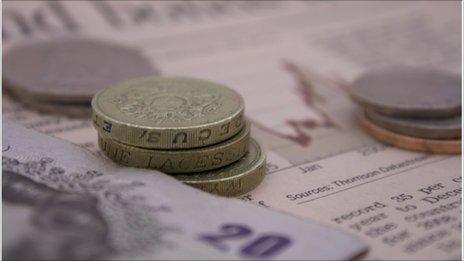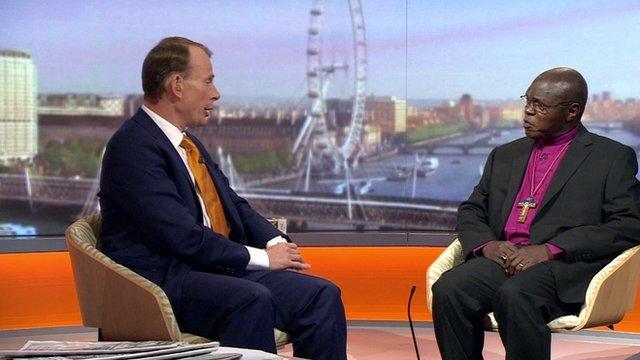Low earners are being left behind, say archbishops
- Published
Archbishop of York, Dr John Sentamu: "Religion without politics is a fantasy"
The Archbishops of Canterbury and York have called for an end to "income inequality" in the UK, warning people and communities are being left behind.
Wider uptake of the living wage would combat "the anxiety of bare subsistence", the two most senior figures in the Church of England said.
The comments feature in a new book edited by the Archbishop of York.
The prime minister's spokesman said the government would continue to help families out of poverty.
Labour leader Ed Miliband welcomed the church leaders' intervention and warned that the country was at risk of returning to the social divisions of the 1980s.
But senior Conservative Lord Heseltine said the archbishops were "factually wrong" and "out of touch".
'New poor'
In his essay collection, called On Rock or Sand? Firm Foundations for Britain's Future, the Most Rev John Sentamu says the country is facing "a new poverty".
Dr Sentamu writes: "The poor in this 'age of austerity' experience what I call a 'new poverty', where many of the 'new poor' are in work.
"Once upon a time, you couldn't really be living in poverty if you had regular wages. You could find yourself on a low income, but not living in poverty. That is no longer so."
In a YouTube video, external released to coincide with the release of his book, the archbishop says: "We need to rediscover the true meaning of the word economy - it means a household, a community whose members share responsibility for each other.
"The giant that must be slayed is income inequality - where some few have far too much and the many have too little."
Speaking to the BBC Radio 4's The World at One, Dr Sentamu said: "Unless we address it, we're still going to find our people trapped, making these choices which I think are not really good for them, for their family, for everybody else."
Welfare should be nothing more than a "safety net", not a long-term solution, he added.
Dr Sentamu is the chairman of the Living Wage Commission, which published a report last year, external recommending a "step change" in the take-up of the living wage.

What is the living wage?

The living wage is based on the amount an individual needs to earn to cover the basic costs of living.
The living wage is set at £9.15 an hour in London and £7.85 an hour in the rest of the UK.
The national minimum wage is significantly lower. Since October 2014, the national minimum wage has been £6.50 an hour for adults aged 21 and over, and £5.13 for those aged 18 to 20.
Prime Minister David Cameron has previously said he supports the idea in principle.
The Labour leader, Ed Miliband, favours making it part of his party's manifesto for the next general election.

Cutting tax
In a separate entry, the Archbishop of Canterbury, Justin Welby, refers to the need to "reimagine our economic landscape so that individuals and communities are no longer left behind".
He echoes Dr Sentamu's argument for wider adoption of the living wage, claiming it would help create "a society where our economic policies are led and governed by our values, and not vice versa".
A spokesman for the prime minister said it was a matter of rebalancing the economy - introducing city deals, enterprise zones and cutting tax.
He said the prime minister was clear about the importance of raising living standards.
But Labour leader Ed Miliband said Church leaders were saying "very clearly" that they did not believe the prime minister's promises.
Lord Heseltine told the World at One the Church was entitled to express its view, but said: "I think it's simply out of touch.
"The speeches for example the chancellor has been making recently in the north are the most imaginative and strategic speeches about rebalancing this country I've ever seen a chancellor make."
"The minister for cities, Greg Clark, has concluded negotiated arrangements with every part of England to give more power economically to every town, city, county in this country."
Lord Heseltine, who released a report on how to boost growth in 2012, added: "I have spent some 30 to 40 years dealing with leaders of local authorities across England and the transformation, and they acknowledge this, is extraordinary.
"The process that is now going on to restore opportunity and power and discretion to those who can influence the local economies has never been so advanced."
The archbishops both present a case for the Church's continued role in public life, stressing that their arguments are not aimed at a particular government or party.
- Published2 November 2014

- Published7 December 2014

- Published1 September 2013
